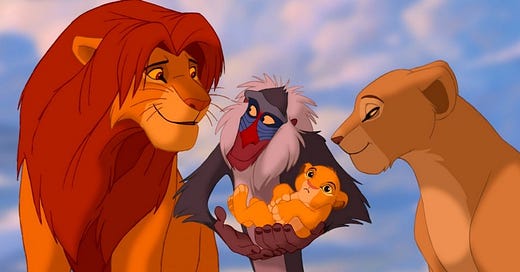The supposed “B-Team” behind Disney’s Lion King (1994) made a beloved classic that I consider to be one of the greatest animation movies ever made. Not just that — it stands to this day as one of my favorite films, period. The plot, voice acting, and songwriting work seamlessly in conjunction and leave little to be desired once the final title flashes upon the screen to signal the film’s conclusion. Let’s get into it.
Note: This review contains spoilers. If you haven’t seen The Lion King (1994), drop everything and watch it as soon as you can, and save this page to return.
A simple but beautiful plot
One of the greatest things about the movie is its simple yet touching and emotionally-driven plot. Simba, a young lion cub whose father Mufasa is “King” of an area in the African savannah known as Pride Rock, aspires to be the great and mighty leader his dad is today. Simba is a carefree, naïve yet lovable young lion who’s looked upon dearly by his mother Sarabi and his best friend, a “lioness cub” named Nala. Simba’s world is turned upside down through a series of events orchestrated by his evil uncle Scar, who wants nothing more than to rid Simba of his rightful place as heir of Pride Rock so that he himself can rule the kingdom.
It’s a classic tale of good vs. evil, with the movie’s sub-90-minute runtime disallowing much space for complex origin stories or nuanced antagonists. You immediately know who the heroes and villains of the story are from the second you lay eyes on them. Because that’s not what this movie’s about. The movie focuses on Simba’s journey from birth to adulthood, all in the context of the circle of life that presents an overarching theme to guide the movie’s events. The first few minutes mirror the last few, and the movie features one of the most satisfying conclusions I’ve ever seen on film. It made me think about what really matters in the grand scheme of things, and how often we can focus on individual trees while failing to take note of the gigantic forest they comprise.
A message to audiences of all ages
This film transcends time, age, and background. It focuses on a different species, is set during an unknown time in history, and has model characters of all ages. Its various messages are spearheaded by highlighting the strength of our past, the continuity and irreplaceable role of time in our lives, and the problem-free philosophy of which we could always use a little more. There’s not one person who can’t take something away from this movie.
A scene in the movie features Simba looking to his dead father’s spirit for advice, having himself forgotten his identity and true purpose. The scene, beyond its moving dialogue and music creating a synchrony so powerful that it can drive almost all audiences to tears, conveys a powerful message to kids and adults alike who may be in a not-so-dissimilar situation to Simba himself (at least metaphorically). These seemingly separated situations around which the movie revolves can be applied to our own lives far more frequently than one may initially think.
A perfect soundtrack
There is not one bad song in this movie. Sure, we all love some more than others, but the lyrical prowess of the music team (including Elton John) never fails to evoke the precisely-intended emotion with their every work. ‘Can You Feel the Love Tonight’ in particular was one of my least favorite songs until I internalized its lyrics and put the love ballad in context with the rest of the movie. It’s a beautifully written song that, again, mirrors very human thoughts and emotions.
Each song has its place in the movie and serves to deliver a concrete purpose beyond just furthering the plot. ‘I Just Can’t Wait to be King’ goes to show Simba’s slight arrogance and lack of responsibility as an initially-spoiled cub who’s never had to go through trauma his whole life, being at the top of the food chain and protected by his all-powerful father. ‘Be Prepared’ goes to show Scar’s attitude towards not just Mufasa but his army of hyenas and demonstrates his perception of power. ‘Hakuna Matata’ is the powerful transition of Simba’s life from one that ended in regret and depression to one that almost uses the catchphrase as a tool to hide his true feelings and escape his ultimate destiny and place in the circle of life. He grows up to be a completely different person and needs a new wake-up call (and song) to be vulnerable enough to even discuss his past again.
My Final Thoughts
This movie is one of the best films to come out of Hollywood animation and certainly one of Disney’s (who usually leads the charge on pushing animation standards anyway) finest works. Its beautiful inculcation of African culture with the relatable story of an individual trying to find his place in the world gives a very humbling view of our own lives and allows us to maybe put into perspective some of the petty worries we often take for granted. The movie is a perfect example of an animation film that is not meant for kids, but rather suitable for them, carrying its G-rating. It is almost unbelievable how well the film develops its complex themes of death, identity crisis, and existentiality in such a short runtime, all the while making us feel completely satisfied by the end. This is truly one for the history books, and while no movie is perfect, this is one that checks all the boxes for me.



